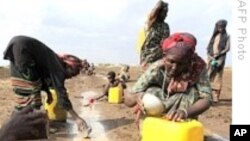<!-- IMAGE -->
The United Nations has
designated March 22nd World Water Day, as a means of focusing attention on the
importance of a clean water supply and advocating for the sustainable
management of freshwater resources. This year's theme is "Water Quality:
Clean Water for a Healthy World."
Safe drinking water is fundamental to healthy lives and prosperous communities.
Every person needs twenty to forty liters of freshwater per day for drinking,
cooking, and sanitation needs alone. Yet some 1.1 billion people world-wide do
not have access to safe, clean drinking water. As a result, many people become
sick, some lives are shortened, and some die. Half of the world's hospital beds
are filled with people suffering from water-borne diseases. According to the
World Health Organization, each year, an estimated four billion people get sick
with diarrhea as a result of drinking unsafe water. More than two million of
them die; mostly children under the age of five, most of them poor, and most of
them living in the developing world.
In developing countries, eighty percent of all waste is discharged untreated,
often because of lack of regulations and resources. As populations and industry
expand, they add to that equation new sources of pollution and increased demand
for clean water. Human and environmental health suffers as a result, and future
agricultural and drinking water supplies are put at risk.
The United States invests hundreds of millions of dollars every year in water
sector activities around the world. The United States Agency for International
Development, or USAID, and the Millennium Challenge Corporation undertake a
number of programs to expand access to clean drinking water for those in need,
as well as to make more efficient the use of water for food production and
economic growth, and work for more sustainable management of watersheds and
ecosystems.
The United States is also working to improve water quality by expanding access
to sanitation services, helping improve hygiene practices, and finding ways to
reduce pollution and improve waste management programs.
The ability of a society to develop is critically dependent on sustainable and
sufficient supplies of high-quality water, and good sanitation services and
practices. We can help solve the problems, but in the end, change must come
from within, with strong investments not only in infrastructure, but also in
local governance and capacity building.





